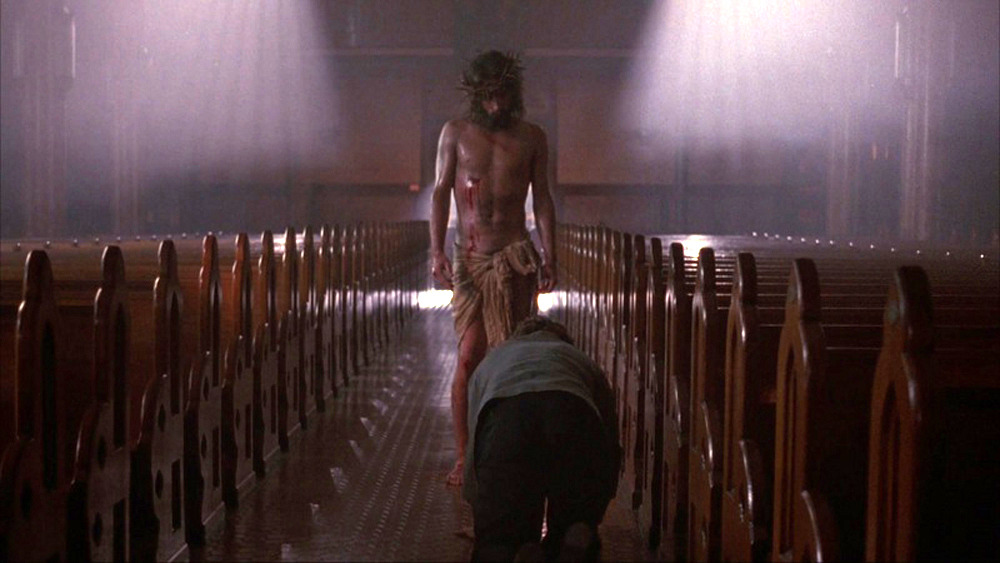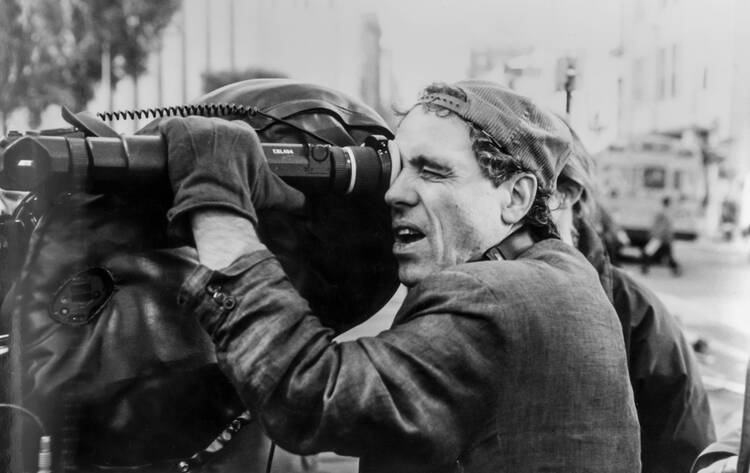|Finn Odum|

Bad Lieutenant plays at the Trylon Cinema from Sunday, March 10th, through Tuesday, March 12th. Visit trylon.org for tickets and more information.
Author’s Note: The following essay discusses themes of sexual assault, contains spoilers for Bad Lieutenant, and is kind of mean to Abel Ferrara.
Last November, I learned that the guy who made the completely mid Body Snatchers and King of New York is the same guy who made Bad Lieutenant. This knowledge came to me against my will, as I was quite content not knowing anything else about the man behind “Spit-licking Larry Fishburn” and “What if we remade this classic for the third time but bad.” This disappointed me. Unlike the rest of Ferrara’s X-rated filmography, Bad Lieutenant was interesting. Exploitative, sure, but interesting.
I think exploitation has its place in film history. Good exploitation films are smart in their provocation. They have points to make about censorship and conservative culture. Before watching Bad Lieutenant, my perception of Ferrara was that his exploitation was not intelligent. One of his more well-known projects is Ms .45, a rape-revenge film about a seamstress who goes on a killing spree after being violently assaulted. Nothing much to say outside of “Let’s watch a woman be brutalized and then get revenge for it.”
Rape-revenge is a difficult subgenre of exploitation. I know survivors. I’ve been in crowds at cult classics where someone I cared about had to leave because of the violent scenes of assault. While I don’t think we should censor films, I recognize that images matter. Witnessing matters. All is not forgiven if the survivor gets revenge, or if the “bad guys” get it in the end. There was still a choice to depict a sexual assault on screen—and often, that decision is being made by a man who’s never experienced it. Being provocative and well-regarded doesn’t quite redeem you.
I take all of this into consideration as I mull over Bad Lieutenant. There’s a lot to say about Ferrara’s Keitel-led police thriller. It’s an NC-17 film that was vile (for the ‘90s), banned (in Ireland), and edited down for censors (with one significant scene taken out). It has nothing to do with the Trylon summer 2022 feature Bad Lieutenant: Port of Call New Orleans, but it clearly lays the foundation for corrupt cop films like its confusing pseudo-sequel. Most importantly—and the reason it’s in our Simmering Fury series—Harvey Keitel is fantastic as the unnamed Lieutenant. Every move he makes is both erratic and completely calm. He’s constantly spiraling down, down, down to hell, and the only thing stopping him from absolutely losing it is his misplaced faith, first in his police badge and second in God.
“I’ve been dodging bullets since I was fourteen…No one can kill me,” he says to a friend, “I’m blessed. I’m a fucking Catholic.”

He believes that. And I believe that he believes that. For a moment, I believe he can’t die, either; that all that cocaine in his system is going to fuel him for the rest of his life. He can’t die, he’s a cop, and if there’s anything I’ve learned about corrupt police is that they never face consequences. The Lieutenant spends most of the film snorting coke and stealing police evidence, gambling away money he doesn’t have and harassing women. He sucks so much and yet I think he’s invincible. Even when he’s jerking off in front of teenagers, a sequence that got cut from the NC-17 original and completely caught me off-guard when I was comparing it to the R-rated version. It’s gross…and a little sad, actually; not only that the girls are forced to expose themselves to a corrupt cop, but also that the Lieutenant is so desperate, so pathetic, that he asks a teenager to simulate oral sex while he yanks it in the street.
Keitel is phenomenal at being a disgusting human I somehow have empathy for. I hated him so much and still wanted him to either succeed or make peace with who he was and bite it. Luckily, the film goes with the latter. During the climax, the Catholic cop comes to terms with his corruption, screaming “AGHHHHHHH” in a way only Harvey Keitel can pull off. He hallucinates Jesus and yells at him, first out of frustration and then for forgiveness. He repents. “Jesus” is actually the wife of a pawn shop owner—I guess God is a woman—and helps him solve the assault case at the center of the film. Instead of pulling a classic “Bad Lieutenant” move, the titular character finds the rapists and sends them out of the city with the $30,000 he was going to use to pay off an angry bookie. The film ends with the bookkeeper killing the Lieutenant in the street. He dies. But he’s redeemed himself. He didn’t let those boys go down the same road as he did. He forgave them.
Is it his place to do that, though?
The woman at the center of the crime, a young nun was raped inside of a Catholic church. A holy place, desecrated. As Keitel says, “that holy thing” (the nun), violated. We don’t quite see her assault, but we do see her naked, through the eyes of the Lieutenant as he peers through a crack in the door at the hospital. She’s objectified from the moment she’s introduced to the minute the Lieutenant is confronting her rapists. To every man in her life—the Lieutenant, the church, her attackers—she’s just a thing.
And somehow, as traumatic as the attack was, as poorly treated as she was, the nun forgives her abusers. She takes back her agency—to give them grace. She thinks they’re young and misguided. She doesn’t want to see them punished for their actions, nor does she want the “justice” the Lieutenant provides her. Every time he tries to reason with her, she denies him. In a moment of confusion, the Lieutenant says, “You’re not the only woman in the world. You’re not even the only nun. Your forgiveness will leave blood in its wake.”

Your forgiveness will leave blood in its wake. Yes, it’s the nun’s choice. Her decision. She has the right to forgive them. And perhaps had this crime been something less violent, less violating, I would understand.
But I don’t. I’m sitting in my living room watching Harvey Keitel slapping two rapists and sending them out of the city with $30,000. I am frustrated. Such a beautiful, powerful line of dialogue in a story that doesn’t understand it. How are we supposed to read that—should we think that they’ve learned their lesson, or should we be filled with dread, knowing they could do that again? The internet can’t help me, as there are critics who regard this as a “powerful tale of Catholic redemption.” What is redemptive about forgiving that kind of violence?
The claims about Catholic redemption refer to the Lieutenant, not the boys; he accepts his corruption, does a good deed, and dies. You can call that getting redeemed…but I don’t think he deserves it. One questionably positive action does not forgive a history of violence. The young men who assaulted the nun do not deserve it either. Neither youth nor poverty nor ignorance are excuses for destruction; though the fictional nun might forgive them for their actions, the audience shouldn’t. They did not learn from what they’d done to her. They have not changed.
So is Bad Lieutenant good because of Keitel’s performance, or bad because of its politics? Man, I don’t know.

And I kind of appreciate that I don’t know. I’m almost impressed that mid-tier director Abel Ferrara wrote a film that inspired this much of an internal dilemma. The operative word there is almost. Ferrara, according to co-writer Zoë Tamerlis Lund, contributed little to the script. I believe it; so many male-driven rape-revenge films from the 20th-century focus on brutal violence, both what happens to the survivor and what happens to their abusers. It creates a spectacle out of an already traumatic, real-world event. Bad Lieutenant, meanwhile, treats the nun a little more sympathetically while still entrenching her in a world of destruction. I do not agree with her choices—but I am not her. She is written as an obstacle on the Lieutenant’s journey, designed by someone with a tinge more compassion and understanding of what it’s like to be a woman. She has agency—but her agency still falls through the cracks of misguided forgiveness.
Has my opinion of Ferrara changed? Absolutely not. I can’t credit him with directing a powerful story of Catholic redemption knowing he probably didn’t write a scene of it. I do, however, appreciate the film for the crisis it presented. I read Bad Lieutenant as a cautionary tale that sometimes, “redemption” isn’t enough. A morally corrupt Lieutenant points out to a woman steeped in Catholicism that just forgiving her abusers will not stop them from abusing others. Thanks to that ideology, he too lets them go. He accepts Christ, accepts his corruption…and still suffers the consequences of his actions. Forgiveness, redemption. Neither is enough.
Edited by Catherine Cavalier

Thank you so much for this piece and for clarifying my confused thoughts on this movie!
“Keitel is phenomenal at being a disgusting human I somehow have empathy for. I hated him so much and still wanted him to either succeed or make peace with who he was and bite it.”
THIS ^
I kept thinking while I watched, “wait–am I hoping the Dodgers win? Am I actually rooting for this guy to get out of trouble?”
Keitel really is something else.